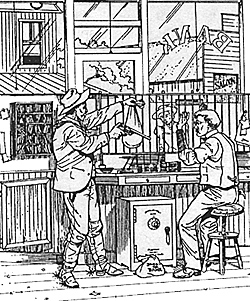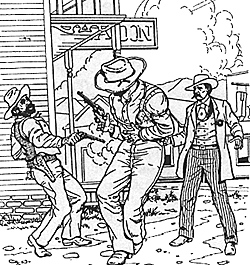When asked in 1938 why four of his brothers had turned outlaw, Littleton Dalton the youngest brother replied: “They were raised in a lawless country and grew up among violent companions, but so did I and four of their brothers. Most of the trouble was that they were not spanked for holding their breath when they were little.” For whatever reason, of the nine Dalton brothers four turned outlaw. But not all Daltons were lawbreakers and not all the outlaws were always outlaws. Everyone knows Bob, Emmett, and Grat from Coffeyville Kansas fame, but few remember Bill Dalton.
The Dalton boys grew up in Missouri. The family moved about and some of them settled in the same Coffeyville that would claim the lives of two brothers and leave a third a cripple for life. They were well acquainted with the exploits of their famous relatives, the Youngers. These were the same Youngers that were part of the James/Younger Gang that terrorized the countryside a few years earlier. It was the James/Younger gang’s “Last Ride” that would serve as the inspiration for the great Coffeyville fiasco. The desire to outdo their relatives was the motivating factor behind that ill-fated day.
The eldest Younger, Frank became a lawman in Fort Smith, Arkansas. It was during this time that the three soon-to-be outlaw brothers, Bob, Grat, and Emmett actually rode posse with the older brother. But when Frank was killed in the line of duty, the three boys decided that breaking the law was better than upholding the law. Despite the urgings of their other brothers, the three Daltons insisted on becoming famous outlaws. They wanted to out do their cousins the Youngers, and decided to rob a train.
On February 6, 1891 the Daltons made their play. They decided upon the Southern Pacific train at Alilia, California. They were sorely unprepared. After a shoot-out left several railroad employees wounded, the Daltons realized they couldn’t get inside the car that contained the valuables. Disgusted, they left in a hurry empty handed with a large number of people ready and willing to identify them.
The three brothers then spent the next four months crisscrossing the Southwest with authorities hot in pursuit. Due to this pursuit the brothers could not even take the time to attempt anymore robberies. Finally, Grat Dalton was captured and stood trial. However, he soon escaped and rejoined his brothers in time to become the sixth member of the new gang that they were forming. Bill Power, Dick Broadwell, and a down on his luck cowboy named Bill Doolin joined the three brothers.
Another Dalton boy, Bill (who was a California politician) tried to help his brothers and was unceremoniously arrested for “aiding and abetting”. Finally he was released for lack of evidence but Bill came away with a particularly bad sense of being “screwed” by the law. This may have been a contributing factor to his turning outlaw years later.
While Bill stewed in jail, the other Daltons spent the time racing here and there seemingly at random, robbing banks, some successfully, and some not. Every account of their exploits always drew parallels to their more famous relatives, the Youngers. This grated on Bob Dalton’s mind until he finally came up with an idea that would catapult the Daltons into fame and surpass their cousins:
They would rob two banks in the same town on the same day.
Although Grat was remembered as being the “dumb one”, Bob decided that Coffeyville would be the perfect place to pull off this daring raid. Never mind that there were lots of people still living in Coffeyville that remembered the Daltons when they lived there. Bob figured they would just wear false beards and mustaches. Right about this time Bill Doolin decided he had heard enough and left the gang. After the robbery attempt, surviving Dalton family members insisted that Doolin had been left behind because the brothers had thought him “mentally awkward”. Not so awkward that he couldn’t recognize a hare-brained scheme when he saw one.
 Wednesday October 5th, 1892
Wednesday October 5th, 1892
The five outlaws rode into Coffeyville. Wearing their false whiskers the five tied their horses in an alley two blocks away from the two banks. Not in front of the banks which were across the street from each other…two blocks away.
As the Daltons emerged from the alley they were immediately recognized. Word spread through town as the citizens raced home to arm themselves. Grat led Bill Power and Dick Broadwell into the Condon Bank while Bob and Emmett entered the 1st National. When the teller told Grat that the vault was time-locked and couldn’t be opened, Grat believed him and settled down to wait. He should have checked, as the teller was lying - the vault was open.
Meanwhile, across the street, Emmett and Bob were coming under fire as the citizens sent a hail of bullets on the 1st National. As the Condon bank also began to take fire the gang decided to pack it in and rushed outside. Bob killed the first citizen, Lucius Baldwin with a blast of his Winchester. Running down the street the boys killed two more citizens as they were trying to make their way to the alley where their horses were.
By now the outlaws in the Condon bank were pinned down. Bill Power took a wound to the arm that effectively prevented him from returning fire. Without windows or a back door to escape the three burst out into the street and into a deadly crossfire. Firing as they ran the three were repeatedly wounded as they fought their way to the alley. Bill Power received a bullet in the back as he tried to mount his horse. He was the first of the outlaws to die.
Just then Marshal Charles Connerly with the local blacksmith John Kloehr ran into the alley. Grat immediately killed the Marshal but himself was shot dead in the throat. By now and although badly wounded, Dick Broadwell managed to actually climb on his horse and ride out of town. But a load of buckshot and another well placed bullet from Kloehr’s rifle slammed into the outlaw. His dead body was found a mile out of town in the dirt.
 Meanwhile, taking fire from the townspeople Bob and Emmett finally made it to the alley. As Bob staggered from his wounds he came face to face with John Kloehr fresh from his run in with the rest of the gang. The best Bob could do was fire off two wild shots before he received a fatal bullet to the chest. Emmett, still unhurt and clutching a grain sack full of loot made it to his horse. But as he mounted he took fire and received three wounds. Instead of trying to escape he rode over to his dying brother and reached down to grab him. It was then that he was blown out of the saddle by two blasts of buckshot in the back.
Meanwhile, taking fire from the townspeople Bob and Emmett finally made it to the alley. As Bob staggered from his wounds he came face to face with John Kloehr fresh from his run in with the rest of the gang. The best Bob could do was fire off two wild shots before he received a fatal bullet to the chest. Emmett, still unhurt and clutching a grain sack full of loot made it to his horse. But as he mounted he took fire and received three wounds. Instead of trying to escape he rode over to his dying brother and reached down to grab him. It was then that he was blown out of the saddle by two blasts of buckshot in the back.
The Battle Was Over
In the end the Daltons got their headlines and in some ways became more famous than their cousins. But it had cost the lives of Bob, Grat, Bill Power, Dick Broadwell, and four Coffeyville citizens. On Oct. 27th, of the same year John Kloehr, who had killed three members of the Dalton gang, was given a gold medal by a group of Chicago bankers. The medal, set with a large diamond, bore the inscription: "John Joseph Kloehr--the emergency arose, the man appeared."
Bill Dalton, hearing of the disaster and the subsequent bad treatment that his brothers had received (some of the citizens posing with the corpses, etc.) took up the outlaw trail. This decision led to his own early demise.
And what of Emmett? The only surviving member of the Coffeyville fiasco, after a long jail term, moved to Hollywood and became a consultant for western films. How different things might have been if only their Momma had given them that spanking.
Back to Citadel Spring 2002 Table of Contents
Back to Citadel List of Issues
Back to MagWeb Master Magazine List
© Copyright 2002 by Northwest Historical Miniature Gaming Society
This article appears in MagWeb (Magazine Web) on the Internet World Wide Web. Other military history articles and gaming articles are available at http://www.magweb.com